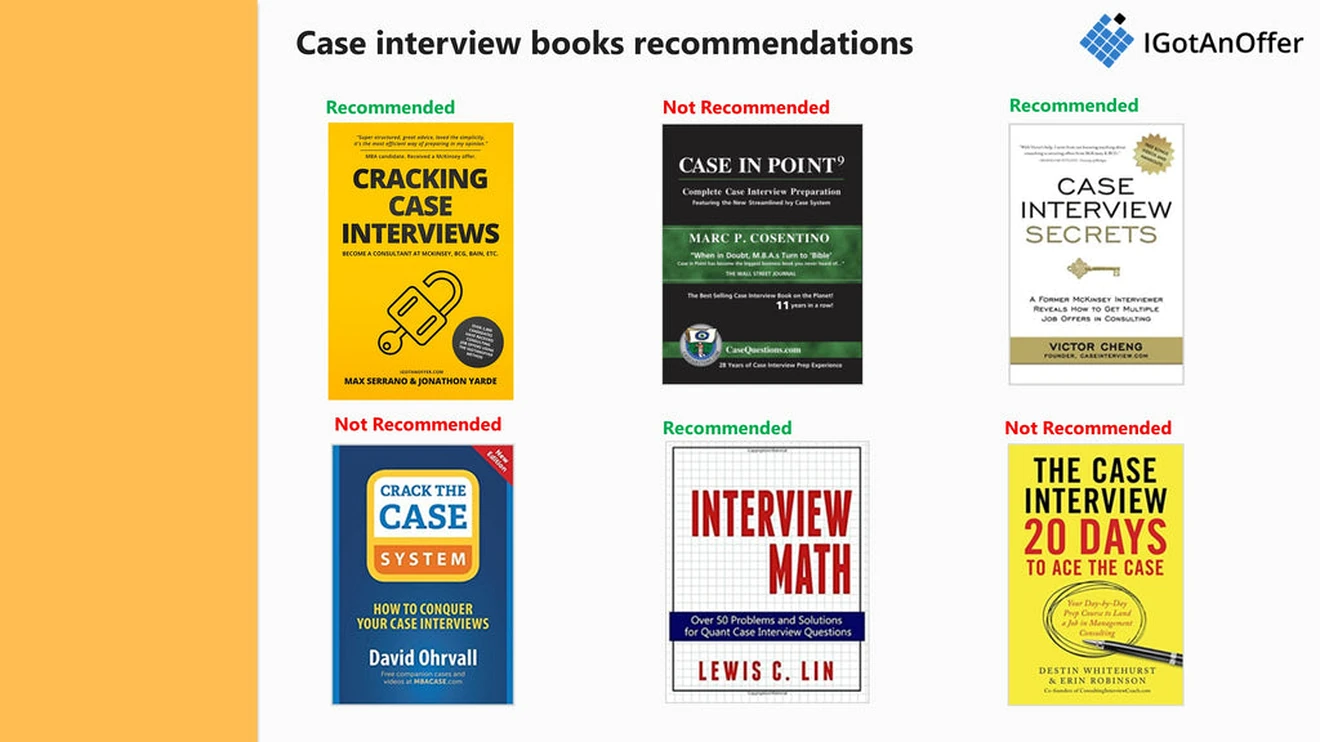A LOT of books offer guidance on how to navigate the case interview process. But here's the thing: time is precious when it comes to preparing for consulting interviews. You simply won't have time to read that many books.
So which ones should you go through to maximise your chances of getting a job at a top consulting firm? Before we go into more detail, here is a quick overview of the best case interview books we would recommend:
- Cracking Case Interviews (By Max Serrano & Jonathon Yarde)
- Case Interview Secrets (By Victor Cheng)
- Interview Math (By Lewis C. Lin)
And 3 popular case interview books we would NOT recommend:
- Case in Point (by Marc Cosentino)
- 20 Days to Ace the Case (by Destin Whitehurst)
- Crack the Case System (by David Orhvall)

Keep reading to find out why we have (or have not) recommended the books listed above.
Click here to practise 1-on-1 with MBB ex-interviewers
1. Cracking Case Interviews, by Max Serrano and Jonathon Yarde – Recommended
This is a little bit cheeky, but we are going to start by recommending our own case interview book. Some of the other books on this list are helpful, but none of them succinctly summarise the full set of the information you need to get a job offer from a leading consulting firm. That's why we worked on Cracking Case Interviews for over a year, to make it the most comprehensive case interview book available.
Cracking Case Interviews was designed to be the only book you'll need to read to land a job at McKinsey, BCG, Bain, or other top consulting firms. The book includes resume and cover letter tips, a step-by-step method for solving cases, 5 practise cases with detailed solutions, strategies for answering behavioural questions, and more.
Authors
The book was written by Max Serrano and Jonathon Yarde, who are former consultants and current members of the IGotAnOffer team. Input was also provided by some of the MBB ex-interviewers who serve as coaches on IGotAnOffer.com (more about them here).
2. Case Interview Secrets, by Victor Cheng – Recommended
Our recommendation
Overall, we would recommend reading Case Interview Secrets as it’s a good introduction to the case interview process. It won’t be enough to get you an interview or a job, but it’s an interesting starting point.
The pros and cons
Cheng writes very authoritatively and personably. He manages to cover a lot of ground using a structure that’s easy to follow. Its main strength is that it gives good insights on how interviewers think, what criteria they use to assess candidates, etc. The information on the difference between McKinsey’s interviewer-led cases and BCG / Bain’s candidate led-cases is also helpful.
That being said, there are a few shortcomings to the book. First, it feels repetitive in places and the content could have been more summarised. This is one of the reasons we developed our case interview guide. Second, as we will explain further in our review of Cosentino's book below, we strongly disagree with Cheng's advice to always re-use the same two frameworks. Interviewers will notice and penalise you if you do this. And third, the book does not include practise cases which would have been helpful to apply the concepts laid out.
Author and content
Victor Cheng is a former management consultant at McKinsey in the US. He is also an independent consultant for mid-size US companies.
The book is split across seven sections. It begins with an overview of the interview and how candidates are assessed. This is followed by a section on maths and a section on the basic tools that are needed when solving cases. Section four details Cheng's two basic frameworks for approaching case studies. The following two sections look at case study formats, and the book concludes on how to combine all of the above skills in order to succeed.
3. Interview Math, by Lewis C. Lin - Recommended
Our recommendation
As maths are an important part of case studies, we would recommend this guide. But don't read it on its own: pair it with other guides that focus on case interviews.
The pros and cons
This is a great book for those looking to strengthen their quantitative skills before their interviews. It is clear, concise, well-structured, and authoritative. The style is less "businessy" than many of the other guides we mention here; the tone is a little more informal and friendly.
That being said, this guide only focuses on getting you comfortable with the numbers. It does not aim to do anything else. For a wider perspective on case interviews, it's essential you look at other material too. Interview Math also suffers a little from being repetitive.
Author and content
Lewis C. Lin is the former Director of Product Management at Microsoft. Besides being the CEO of the coaching firm Impact Interview, he also appears on news outlets such as Business Insider and The Atlantic.
In just ~150 pages, the book does a thorough job of defining different kinds of concepts, including market sizing, revenue estimates, profitability, breakeven, price elasticity, and lifetime value. For each topic, the book also provides problems that go from simple to complex, which are broken down in a way that makes them easy to understand.
4. Case in Point, by Marc Cosentino – Not recommended
Our Recommendation
This will probably be controversial, but although it's been the best-selling case interview book on Amazon for a long time, we do NOT recommend reading Case in Point. The main reason is that the whole book relies on learning and applying a series of 10+ frameworks to crack cases. As we have explained in the past, your interviewer will penalise you if you use a pre-defined case framework and you should avoid this at all costs.
The pros and cons
Cosentino's style is fun and conversational, and he brings many anecdotes to the table from the time he has spent helping students prepare for management consulting interviews. The book is well laid out and easy to follow. It also includes sample cases and a short section on how to behave in interviews which are helpful.
However, as hinted above, interviewers will immediately spot if you are trying to force-fit their case into a predefined framework from Case in Point. In our experience, instead of learning frameworks by heart, the best candidates invest time and energy into learning how to build custom frameworks for every case. It's actually much easier than you might think!
Author and content
Marc Cosentino is the former Associate Director of Career Services at Harvard.
Cosentino's guide is ~250 pages long. It begins with a general section on the interview, tackles different case types next, then moves on to a description of Cosentino's "system". Finally, additional frameworks are detailed.
5. 20 Days to Ace the Case, by Destin Whitehurst - Not recommended
Our Recommendation
The concepts covered in this book are interesting, but we find the 20-day "boot-camp" structure to be somewhat gimmicky. If you want to purchase the book, we would recommend reading it to learn about the concepts it covers. But we would not recommend you follow its 20-day structure to prepare for your interviews, because we don't feel you will be prepared enough after following it.
The pros and cons
The book introduces concepts such as the profitability framework and internal vs. external frameworks which you should know about for your consulting interviews. The writing is crisp and clear, and divided into short engaging chapters. Throughout the book there are brief anecdotes on interview experiences which make it entertaining.
There are two main drawbacks to the book. First, it assumes that you have already done substantial research on consulting interviews. For instance, the behavioural part of consulting interviews is not addressed in depth. Second, 9 of the 20 days in the programme are dedicated to doing a mock interview. While doing mock cases is sound advice, in our experience, most candidates who are successful at case interviews have done 30+ cases. We therefore don't recommend following the 20-day structure to the letter.
Author and content
Destin Whitehurst is a senior consultant at Deloitte.
The book is divided across twenty chapters that should be read in twenty days, as a lead up to the actual interview. Besides offering daily exercises, the book describes various consulting firms, nine mock interviews, advice on what questions to ask the interviewer, anecdotes from past candidates, and strategic insights from the author.
6. Crack the Case System, by David Orhvall – Not recommended
Our Recommendation
We don't want you entering the interview with too much clutter in your mind. Interview guides should be thorough, but they should also be distilled. We find that Crack the Case System really overcomplicates case interviews. As a result, we recommend that you pass over this one.
The pros and cons
The book does a good job of guiding the reader through every step of the process while providing a holistic approach to cases. It doesn't rely on strict frameworks either.
The main challenge we found with this book is that it tends to over complicate case interviews. One issue is the excessive use of mnemonics, through trademarked short forms like IMPACT and SPECIALT. The other issue is that the book is a companion piece to a very large amount of online material that includes test cases and a collection of videos. This is all very time-consuming and repetitive, rather than getting to the point.
Author and content
David Orhvall was a management and operational consultant at Bain & Company.
The book is ~300 pages long and categorises 13 different case types or "roadmaps". It covers every aspect of the interview: how to think like a consultant and how to tackle quantitative problems, how to communicate effectively, how to engage in small-talk, and how to arrange notes.
Conclusion
Our overall recommendation is that you prepare with Cracking Case Interviews. If after this you still want more guidance and would like to read more books, then we would recommend picking up a copy of Case Interview Secrets and Interview Maths.
How to prepare for X interviews
We've coached more than 15,000 people for interviews since 2018. There are essentially three activities you can do to practise for interviews. Here’s what we've learned about each of them.
Learn by yourself
Learning by yourself is an essential first step. We recommend you make full use of the free prep resources on this consulting blog and also watch some mock case interviews on our YouTube channel. That way you can see what an excellent answer looks like.
Once you’re in command of the subject matter, you’ll want to practice answering questions. But by yourself, you can’t simulate thinking on your feet or the pressure of performing in front of a stranger. Plus, there are no unexpected follow-up questions and no fee
Practise with peers
If you have friends or peers who can do mock interviews with you, that's an option worth trying. It’s free, but be warned, you may come up against the following problems:
- It’s hard to know if the feedback you get is accurate
- They’re unlikely to have insider knowledge of interviews at your target company
- On peer platforms, people often waste your time by not showing up
For those reasons, many candidates skip peer mock interviews and go straight to mock interviews with an expert.
Practise with experienced MBB interviewers
In our experience, practising real interviews with experts who can give you company-specific feedback makes a huge difference.
Find a consulting interview coach so you can:
- Test yourself under real interview conditions
- Get accurate feedback from a real expert
- Build your confidence
- Get company-specific insights
- Learn how to tell the right stories, better.
- Save time by focusing your preparation
Landing a job at a top consulting company often results in a $50,000 per year or more increase in total compensation. In our experience, three or four coaching sessions worth ~$500 will make a significant difference in your ability to land the job. That’s an ROI of 100x!
Click here to book case interview coaching with experienced MBB interviewers.















